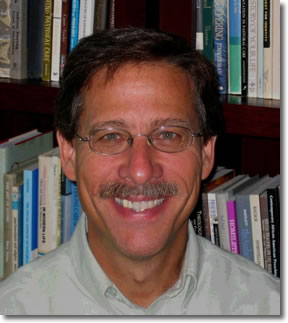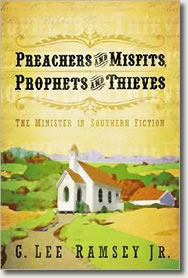An Interview with Lee Ramsey
The author of Preachers and Misfits, Prophets and Thieves talks about why we should pay attention to ministers in Southern fiction
G. Lee Ramsey, Jr. knows about Southern preachers. A Georgia-bred preacher's kid who became an ordained Methodist minister himself, Ramsey spends his time with both real-life Southern preachers (he teaches homiletics and pastoral theology at Memphis Theological Seminary) and the preachers found on the pages of Southern literature. It is that second group that spurred him to write his latest book, Preachers and Misfits, Prophets and Thieves.For Ramsey, these fictional preachers can teach us as much about faith as real ones. Characters from the South's great authors—writers such as Ralph Ellison, Flannery O'Connor, Walker Percy, Anne Tyler, Gail Godwin, and Will Campbell, to name a few—populate Ramsey's book and help us understand what faith-filled living is really about.
Lee Ramsey talked to explorefaith about his book and what we can learn from the preachers of Southern literature—the good ones, the bad ones, and the ones we can't quite peg.
 explorefaith: In your introduction, you
write, “These
fictional ministers
can help us question and
refine our own theology, self-understanding,
moral
practices
and approaches to pastoral ministry and the Christian
life.” What are
a few of the questions they raise and refinements they
suggest
that people in
the pews may want to consider?
explorefaith: In your introduction, you
write, “These
fictional ministers
can help us question and
refine our own theology, self-understanding,
moral
practices
and approaches to pastoral ministry and the Christian
life.” What are
a few of the questions they raise and refinements they
suggest
that people in
the pews may want to consider?
Lee Ramsey: One of the most persistent questions these quirky fictional ministers ask is how seriously do we take our faith? When Hazel Motes, in Flannery O’Connor’s Wise Blood, barks out, “If you’ve been redeemed, I wouldn’t want to be,” it snags our attention. He’s asking us as readers whether Christian faith and belief makes any difference at all in the way we live, in what really matters to us? That’s a pretty good question in an age where we seem to be drowning ourselves in everything else but Christian faithfulness, whether it is in materialism and greed, entertainment, or wispy notions of spirituality.
Similarly, ministers like L. Ray Flowers in Clyde Edgerton’s Lunch at the Piccadilly or Rev. Byron Egan in Barry Hannah’s Yonder Stands Your Orphan ask the contemporary church, “Who has the church forgotten?” Have we forgotten our elderly members who populate the nursing homes? Or what about the incarcerated criminals? Who cares for them? These are not easy questions for the church to hear or ask, but they are the ones that a church seeking to be faithful to Christ might want to consider.
explorefaith: Do you think fictional characters are more effective in raising issues than someone in real life?
Lee Ramsey: In some instances they are because they have the ability to cut through our fixed understandings of life and faith. These fictional characters love to tell the truth, but in the wonderful phrase of Emily Dickinson, to “tell it slant.” In the powerful way that fiction works, these “minister stories” have the ability to transform us as readers as well as the characters within the story.
explorefaith.org: Beyond paring down the field, are there other reasons why you chose to focus on ministers portrayed in Southern fiction?
Lee Ramsey: Well, yes. First, Southern fiction is peculiarly religious, given the overwhelming influence of conservative, Protestant evangelicalism on the region. It just seeps into the fiction of the region. As William Faulkner commented on religion in the South, “It’s just there. It has nothing to do with how much of it I might believe or disbelieve — it’s just there.” While fiction from other regions also focuses upon religion, Southern fiction opens multiple windows upon Christian faith for the reader. Second, I chose to focus upon Southern fiction because I love reading it. I decided that since I was going to spend several years looking at the minister in fiction, I may as well go with the literature that most excites me.
explorefaith: Many of the preachers in your book shake up the characters who interact with them, either by how they live their lives or what they ask other characters to do. At times you contrast their unsettling message and style with the “comfortable faith” that some people practice today. What’s lacking in a faith of comfort?
Lee Ramsey: Your question points to one of the most challenging yet hopeful things about these fictional ministers. Frequently they goad us to question a faith that helps us become “well adjusted” to modern and postmodern living. Jesus of the Gospels is anything but comfortable and well adjusted; neither were his disciples. If there is not a radical and creative edge to Christian faith, these fictional ministers seem to be asking, then what’s the point? If worship only serves to tamp down our spirits, shelter us from strangers, and confirm our own prejudices, then we may be following a dead religion rather than a living Savior. We see this in so many of the fictional ministers, from Flannery O’Connor’s characters to those of Lee Smith and Ralph Ellison.
explorefaith: Some of the preachers you discuss in your book are eccentrics—misfits, as you call them. Many people these days feel they they don’t quite fit in a certain church. How can these fictional misfits help real-life misfits benefit from a community of faith?
Lee Ramsey: The misfits of Southern fiction may just open the door of Christian hospitality if they don’t scare us away with their oddball behavior. I am particularly fond of Anne Tyler’s Rev. Emmett in Saint Maybe. He is a quirky character who ministers at the non-denominational, storefront “Church of the Second Chance,” who refreshingly says to visitors, “We use only first names in our place of worship. Last names remind us of the superficial.” Rev. Emmett pushes us beyond denominational factionalism and moribund ritualism that repels the religious seeker. He helps us see that God is reaching out to every woman, man, and child within creation. Church is really about human community centered in Christ and giving generously to others – love of God and love of neighbor. Emmett tries hard to create a Christian community where these deepest of Christian values hold true. In such real life congregations, the misfit can find a home.
explorefaith: Then there are the toxic preachers, like those depicted in Will Campbell’s The Convention or Cassandra King’s The Sunday Wife, who poison the church with their own personal agenda. What about these preachers who use the church for their own purposes?
Lee Ramsey: Campbell and King both present clergy characters who defame the church and its ministry. Their personal ambitions, pursued at all costs, wreck the lives of others and destroy the integrity of the Church. Unfortunately, these fictional ministers are based upon real life counterparts. In the name of God, some ministers exploit, manipulate, and abuse others for personal gain and satisfaction. We must hold such ministers accountable for their abuses and support congregations as they seek to recover from ministerial malfeasance.
explorefaith: Some of these fictional preachers are highlighted because in their very humanness, they show us what a real and committed relationship with God can be. That is their role as a minister. What should we look for as we try to find people who can minister to us and help us live into the Christian life?
Lee Ramsey: Gail Godwin’s Evensong and William Hoffman’s “A Question of Rain” offer appealing images of the minister within community. It is a truism that all ministers are human. They cannot nor should they attempt to be more than human. At that same time, we need to see ministers who, while admitting their own shortcomings, still practice a way of life that, however dimly, reflects the image of God within humanity. Their practices of prayer, worship, accountability to others, stewardship, telling the truth show us a way of life that is faithful to God and responsive to the needs of others. They demonstrate in words and deeds what it means, as Gail Godwin’s Rev. Margaret Bonner says, to practice “the grace of daily obligations.” We should look for ministers whose daily habits bear the distinctive marks of Christian faithfulness, yet who are humbly aware of their own fallibility just like everyone else.
explorefaith: Which of the preachers was most interesting for you? Who would you want to be the minister at your church?
Lee Ramsey: For me, the most interesting minister in this book is Barry Hannah’s Rev. Byron Egan in Yonder Stands Your Orphan. A reformed criminal and non-denominational minister, he carries out his work in Mississippi on the fringes of Southern culture among gamblers, prostitutes, and drug addicts. He relentlessly pursues not only personal sin but the wider forces of social sin. As he says, “When he works with evil, he works with evil.” He wants to wake us up to the forces that destroy humanity and creation, and he energizes the church to be a “Church of the Open Doors.” Barry Hannah’s juiced-up writing pumps life into this minister who careens from one gritty insight to another.
But to be honest, I wouldn’t want Byron Egan to be my minister. He’s too manic for my own religious sensibilities. The Church needs ministers like Egan, but I couldn’t handle him on a regular basis. I am more drawn to Gail Godwin’s Rev. Margaret Bonner in Evensong or Rev. Tarmigian in Richard Bausch’s short story, “Design.” These are ministers who do not take themselves too seriously; they have a sense of humor. They value preaching and the sacraments, and they understand the way in which both build up the community of believers. They could draw me more deeply into the mysteries of the faith and would be the kind of minister who I would want to show up when I was sick in the hospital.
explorefaith: Preachers use the power of words to tell the story of God, to spread the news about the Word, that is Christ. Would you say that the writers who created theses fictional characters are in fact preachers themselves?
Lee Ramsey: No, I wouldn’t say that writers are preachers themselves, but preachers and writers do share a fierce love for words and a deep conviction of the power of words and stories to transform. In addition, Southern writers and preachers, at least until recently, have both been culturally immersed in Scripture, which shapes sermons as well as stories. But the two are not the same. Clyde Edgerton draws the distinction by saying, ““Messages are for preachers and essayists. Stories are for novelists.”
explorefaith: As a minister who loves to read fiction, what books would you suggest someone read for their own spiritual nurture and faith formation?
Lee Ramsey: Besides the novels and short stories that I reference in Preachers and Misfits, Prophets and Thieves, I would recommend Marilynne Robinson’s remarkable novels, Gilead and Home, both for the beauty of the writing and the quiet depth of religious insight of the author. Wendell Berry’s poems and essays always stir my heart, mind, and soul and reward repeat readings, especially as society catches up to his vision of the relationship between tending the earth and tending the human community.
